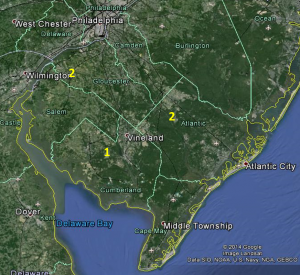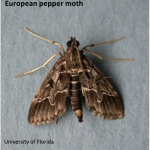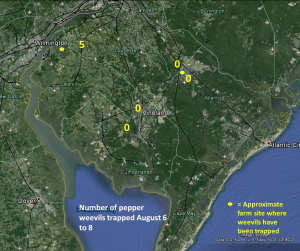The two past winters, 2013/2014 and 2014/2015, were harsh with frigid temperatures surging repeatedly deep into the South. The result was a decline in the populations of some migratory pests, like cabbage looper and beet armyworm, which normally appear here during the growing season. So what about 2015/2016, an exceptionally mild winter? [Read more…]
Field Infestations of Pepper Weevil Found
Two light infestations of pepper weevil have been found, one in Oldman’s township and the other in the Hammonton area. In both cases the infestations are relatively small and at this time of season potential yield loss will be less than had the infestations occurred in May or June. Weevils were also caught at a produce handling facility near Swedesboro.
[Read more…]
Pepper Weevil Trap Counts

The map shows the general location of traps and the number of weevils caught between April 17 and 28
Adult pepper weevils have been caught in some of the traps that are set at or near produce handling facilities in southern New Jersey. Since Florida vegetable crops newsletters indicate severe populations of pepper weevils in some regions of that state, this is not surprising. Pepper weevils escaping into the environs around these facilities may be a problem if they are able to find solanaceous weeds before crops like peppers, tomatoes and eggplant are transplanted.
We will report weekly the numbers of weevils caught in the area and their general location in a map like the one here. Between April 17 and April 28, 5 weevils have been caught. Pepper farmers near these areas should consider monitoring for the presence of weevil once they have transplanted their peppers to the field. For more information contact Joe Ingerson-Mahar at mahar@njaes.rutgers.edu
Pepper Weevil Situation for 2014
Sign up for pepper weevil monitoring with the Rutgers IPM Team. Our base fee is $450 per farm and $100 per trap deployed. If we are already doing insect trapping or field scouting at a farm, then the only additional cost is for the weevil pheromone traps. We suggest that one trap be set in a high traffic area near the packing shed and then at least one trap per field.
For more information or to sign up for weevil monitoring, contact Joe Ingerson-Mahar, phone – 856-889-5718, or email, mahar@aesop.rutgers.edu
For the past two years we have had two NE-SARE grants and a grant from the Charles and Lena Maier Fund, New Jersey Vegetable Growers Association, to study the movement of pepper weevil within New Jersey and how it arrives here. This article summarizes our findings and what the situation is for 2014. [Read more…]
Does a Harsh Winter = No Crop Pests?
It has been in the news, of course, about the severity of the 2013/2014 winter with record breaking low temperatures and higher than normal snow amounts in many locations. So how does all this translate to crop insect pests? As an article that I read last week said, “It’s complicated”.
There are many factors that affect insect mortality through the winter months. It is not only just the cold, but the amount of snow cover, overall fitness of the insects going into the winter diapause (hibernation), how well protected were they from the cold, what the weather conditions are coming out of winter, and so on.
What to Expect
Local native insects are much more likely to survive the winter than southern migratory insects. [Read more…]
European Pepper Moth Update
 Composite list of known host plants for European Pepper Moth (pdf)
Composite list of known host plants for European Pepper Moth (pdf)
So far as known, this moth has been found in only one New Jersey greenhouse operation. However, it has been found in several greenhouses in the Mid-Atlantic area, in 2013 and 2014, and will likely become more widespread until growers become more aware of this pest. Dr. Stanton Gill, University of Maryland, is working on this insect. [Read more…]

